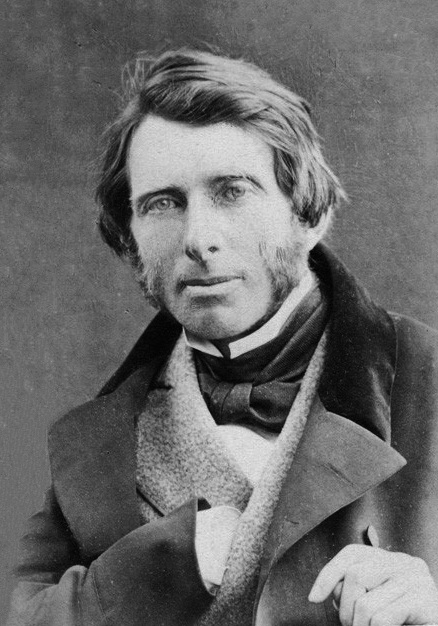architecture is the art which so disposes and adorns the edifices raised by man, for whatsoever uses, that the sight of them may contribute to his mental health, power, and pleasure
The Seven Lamps of Architecture - Página 7 http://books.google.com/books?id=yxscPx9aLM8C&pg=PA7, de John Ruskin - Publicado por Wiley, 1865 - 186 páginas
John Ruskin Frases famosas
“Acho que a primeira prova da grandeza de um homem é a sua humildade.”
I believe the first test of a truly great man is his humility
The True and the Beautiful in Nature, Art, Morals, and Religion - Página 338 http://books.google.com/books?id=zz5LAAAAMAAJ&pg=PA338, de John Ruskin, L. C. Tuthill - Publicado por John Wiley & Son, 1867 - 452 páginas

Citações de homens de John Ruskin
Variante: A maior recompensa para o trabalho do homem não é o que se ganha, mas o que ele nos torna.
In health of mind and body, men should see with their own eyes, hear and speak without trumpets, walk on their feet, not on wheels, and work and war with their arms, not with engine-beams
The Works of John Ruskin: Praeterita. 1886-87 - Volume 22 - Página 367, John Ruskin - Allen,1887
John Ruskin frases e citações
Variante: Dificilmente existirá alguma coisa neste mundo que alguém não possa fazer um pouco pior e vender um pouco mais barato. E as pessoas que consideram o preço somente, serão suas merecidas vítimas.
“A esperança deixa de ser felicidade quando acompanhada de impaciência.”
Hope herself ceases to be happiness when impatience companions her.
The Ethics of the Dust: Ten Lectures to Little Housewives on the Elements of Crystallisation, página 61 https://books.google.com.br/books?id=pzlcAAAAcAAJ&pg=PA61, John Ruskin - John Wiley & Son, 1866 - 250 páginas
Variante: A própria esperança deixa de ser ventura quando a impaciência a acompanha.
John Ruskin: Frases em inglês
Notes on the General Principles of Employment for the Destitute and Criminal Classes (1868).
Essay IV: "Ad Valorem," (p. 135 of 1881 edition http://books.google.com/books?id=59UWAAAAYAAJ&dq=%22leaving%20heaven%20to%20decide%20whether%20they%20are%20to%20rise%20in%20the%20world%22%20intitle%3AUnto%20intitle%3AThis%20intitle%3ALast%20inauthor%3AJohn%20inauthor%3ARuskin&pg=RA1-PA135#v=onepage&q=%22leaving%20heaven%20to%20decide%20whether%20they%20are%20to%20rise%20in%20the%20world%22%20intitle:Unto%20intitle:This%20intitle:Last%20inauthor:John%20inauthor:Ruskin&f=true|).
Unto This Last (1860)
St. Mark's rest; the history of Venice (1877).
Fors Clavigera, letter v (1 May 1871).
Fors Clavigera (1871-1878 and 1880-1884)
A Joy for Ever, lecture II, section 74 (1857).
Fonte: Dictionary of Burning Words of Brilliant Writers (1895), P. 264.
Volume III, part V, chapter II (1856).
Modern Painters (1843-1860)
Volume V, part IX, chapter III, section 52 (1860).
Modern Painters (1843-1860)
Lecture III
Lectures on Art (1870)
Volume I, part I, chapter II, section 9 (1843).
Modern Painters (1843-1860)
“Fine art is that in which the hand, the head, and the heart of man go together.”
The Two Paths, Lecture II: The Unity of Art, section 54 (1859).
At the annual meeting of the Royal Society for the Prevention of Cruelty to Animals (1877), in Arrows of the Chase, vol. 2 (in The Complete Works of John Ruskin, vol. 23 https://books.google.it/books?hl=it&id=Gpc3AAAAYAAJ), p. 129.
“There is really no such thing as bad weather, only different kinds of good weather.”
Quoted by John Lubbock, 1st Baron Avebury, The Use of Life, chapter IV: "Recreation" (1894).
Volume III, part IV, chapter XII (1856).
Modern Painters (1843-1860)
Lecture II, section 32.
The Eagle's Nest (1872)
Volume II, chapter VI, section 16.
The Stones of Venice (1853)
On Richard Wagner's Die Meistersinger
Letter to Georgiana Burne-Jones (June 30, 1882).
Quote, c. 1850's; describing Turner's perspective lectures; as quoted in The life of J.M.W. Turner, Volume II, George Walter Thornbury; Hurst and Blackett Publishers, London, 1862, p. 108
“In general, pride is at the bottom of all great mistakes.”
Volume IV, part V, chapter III, section 22 (1856).
Modern Painters (1843-1860)
Fonte: Dictionary of Burning Words of Brilliant Writers (1895), P. 123.
Volume III, part IV, chapter XII (1856).
Modern Painters (1843-1860)
On the Condition of Modern Art, lecture (1867).
Fonte: The Seven Lamps of Architecture (1849), Chapter III: The Lamp of Power, section 13.
“A little group of wise hearts is better than a wilderness full of fools.”
The Crown of Wild Olive, lecture III: War, section 114 (1866).
Fors Clavigera,, letter xlii, ( 1 June 1874 https://archive.org/stream/forsclavigera02ruskiala#page/204/mode/2up; quoted by William Archer in America To-Day).
Fors Clavigera (1871-1878 and 1880-1884)
“Engraving is, in brief terms, the Art of Scratch.”
Ariadne Florentina: Six Lectures on Wood and Metal Engraving, with Appendix, lecture I: Definition of the Art of Engraving, section 34 (1872).
Fonte: Dictionary of Burning Words of Brilliant Writers (1895), P. 563.
Essay III: "Qui Judicatis Terram," section 54.
Unto This Last (1860)
